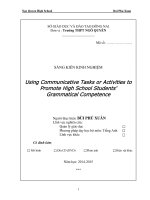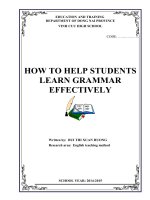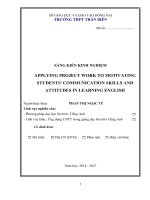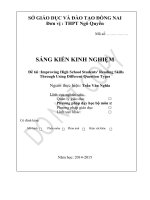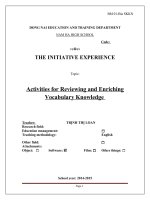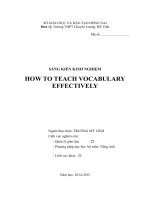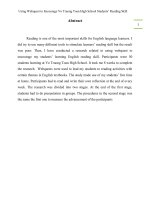SÁNG KIẾN KINH NGHIỆM Improving High School Students Reading Skills Through Using Different Question Types
Bạn đang xem bản rút gọn của tài liệu. Xem và tải ngay bản đầy đủ của tài liệu tại đây (254.15 KB, 13 trang )
SỞ GIÁO DỤC VÀ ĐÀO TẠO ĐỒNG NAI
Đơn vị : THPT Ngô Quyền
Mã số: ………………
SÁNG KIẾN KINH NGHIỆM
Đề tài :Improving High School Students' Reading Skills
Through Using Different Question Types
Người thực hiện: Trần Văn Nghĩa
Lĩnh vực nghiên cứu:
Quản lý giáo dục
Phương pháp dạy học bộ môn
Phương pháp giáo dục
Lĩnh vực khác:
Có đính kèm:
Mô hình Phần mềm Phim ảnh Hiện vật khác
Năm học: 2014-2015
SƠ LƯỢC LÝ LỊCH KHOA HỌC
I. THÔNG TIN CHUNG VỀ CÁ NHÂN
1. Họ và tên: Trần Văn Nghĩa
2. Ngày tháng năm sinh : 20-11-1963
3. Nam/Nữ: Nam
4. Địa chỉ: B 28-Khu Phố 6- phường Tam Hiệp- Biên hòa
5. Điện thoại: 0913130131 Cơ quan: 0613829029 Nhà riêng:
6. Fax E-mail:
7. Chức vụ: Tổ trưởng
8. Đơn vị công tác: THPT Ngô Quyền
II. TRÌNH ĐỘ ĐÀO TẠO
- Học vị (hoặc trình độ chuyên môn, nghiệp vụ) cao nhất: Thạc sĩ
- Năm nhận bằng: 2001
- Chuyên ngành đào tạo: Giảng dạy tiếng Anh
III. KINH NGHIỆM KHOA HỌC:
- Lĩnh vực chuyên môn có kinh nghiệm:
- Số năm có kinh nghiệm: 24 năm
- Các sáng kiến kinh nghiệm đã có trong 5 năm gần đây:
- Improving High School Students’ Written Competence Through
Teaching Grammar in Context
- Using Barrett’s Taxonomy to Enhance High School Students’ Reading
Comprehension.
- Improving High School Students’ Speaking Skill Through Role-play.
- Improving Grade 10 Students’ Grammatical Competence Through
Context.
Improving High School Students' Reading Skills Through Using Different
Question Types
Introduction
Since the first term of the school year 2015, all high school students in Vietnam
must be assessed with the four language skills : listening, speaking, reading and
writing based on students’ communicative competence. Most of the teachers in
Dong Nai Province are aware of the importance of communicative English
teaching and learning to the students’ success in the final examination. There
are a number of things the teachers should do in order to promote the students’
comminicative competence. In this paper, I would like to focus on reading skill
because the students in my school are not good at reading in terms of authors or
writers’ rhetorical relationships, pragmatic considerations and implied meaning.
My interest in the area of ‘Improving High School Students' Reading Skills
Through Using Different Question Type’ started when I attended a conference
in Ho Chi Minh City on assessing and evaluating students’ communicative
competence in 2014.As an attempt to improve high school students’competence
I will carry out this mini-research with empirical methods . I am in the belief
that I can make an innovation in English language teaching and learning at Ngo
Quyen High School, where there are over 1000 students need to become
competent English users .
This research project aims to find out about the effects of using different
question types on the development of high school students’ reading
comprehension at Ngo Quyen High School. The research also aims to identify
students’ problems with the hope that different question types can help increase
their levels of thinking. The research project consists of an introduction, a
review of worthwhile literature related to the independent variable, the types of
questions and their benefits, a description of students’ learning styles, learning
habits, preferences and their views of reading learning activities. The final parts
of the research paper are sections discussing on anticipated outcomes and
possible problems occurring during the research project together with a brief
conclusion.
Context
Bien Hoa is an industrial city, where there are many foreigners who come to
work in industrial zones and to do business. Most foreigners use English to
communicate with their colleagues, office workers, local residents. That is why
English has become a popular language for people at work and young students
at schools.Among the high schools in the city, Ngo Quyen is one of the biggest
high. Each year, this school has over one thousand students who are good at
various subjects, such as mathematics, chemistry, physics and biology, but their
four English skills are not good enough.
In discussion with some students, I have known that they really want to
learn English for communication. However, they do not have many learning
strategies for inferring meaning or evaluating characters and author’s attitudes
Contrary to my expectations, what they often do in the reading lessons is to
copy words, phrases the teacher already writes on the board. They then
translate the text into Vietnamese before completing exercises, answering
questions in their textbooks.
As a teacher of English, I recognize that teaching reading, a receptive skill is
particularly important because a reading text can be a model for writing. An
innovation in teaching reading can facilitate other language skills.
Rationale
In some informal discussions with students and teachers, I have known that
problems facing the reality of teaching and learning reading in high schools are
that comprehension is not effectively achieved and students do not have reading
strategies. Only form is focused, literal comprehension is exploited and teachers
have a tendency to make use of questions available in the textbooks. Therefore,
our students find it difficult to achieve good results in IELTS, TOEFL and
TOEIC tests .While teachers are expected to help students of mixed-ability
understand the reading texts to synthesis, evaluation and appreciation levels.
As teachers we need to be good at making questions with different levels of
understanding and our responsibility is to teach our students how to ask
questions before, during and after they read a text. Not only does asking
questions help the readers to better understand the text they are reading but it
can be applied to all subjects, like social sciences, social studies, and even
mathematics when they graduate from high school.
Research Questions:
1.Is teaching reading through using different question types much more
effective than teaching reading with questions available in the text book?
2.Are there any necessary changes to the reading lessons to foster the learning
and teaching of reading ?
Literature Review
In English teaching, there are many approaches to reflect top down and
bottom up processes through interactive exercises and tasks. The use of
questions is an integral aspect of such activities, and well-designed
comprehension questions help students interact with the text to create or
construct meaning. We believe that it is critical that teachers help their students
create meaning and it is obvious that different comprehension questions at
higher levels of thinking help our students begin to think critically .
It is true that reading is an interactive process in which the reader
constructs meaning with the text. We need to help our students learn to do this.
This means going beyond a literal understanding of a text, and allowing our
students to use their own knowledge while reading. When questions is beyond a
literal understanding, students' answers have to be motivated by information in
the text (Crisp 1978). Inferential questions can have clearly correct responses.
In contrast, prediction and evaluative answers may be correct or incorrect as
long as they depend primarily on students' reactions to what they read.
Evaluative answers not only depend primarily on students' reactions to what
they have read, but they need to reflect a broad understanding of the text.
Another reason for using a variety of questions is that they involve different
types of comprehension. Guszak (1967, cited in Pearson and Johnson,
1972:.154) state that students can perform best when answering questions of
factual recall, which is the type of question that their teachers ask most often.
This means that students can do best at what they have been taught and
practiced. Thus, if we want our students to be able to reach deeper
understanding of a text, then it is necessary to teach them how to do this and to
give them opportunities to work with different types of comprehension.
Barrett’s Taxonomy of comprehension types is an overview of types of
understanding that foreign language learners need to have if they want to read a
text with more than a literal understanding.
The taxonomy of the types of comprehension questions may also be used as a
checklist for language teachers to make their own comprehension questions for
texts that their students read to help them understand better what they read in
reading comprehension lessons in school. In addition, they can be used to
develop materials to ensure that the various levels of questions are used to help
students improve their reading skills as well as respond to a variety of types of
comprehension.
As Rogers( 2007) suggests that types of question includes factual questions
(negative and positive), reference questions can help weaker learners to locate
information. Question types, such as method questions, opinion and inference
questions and others assist readers with deeper understanding of the text or the
author’s attitudes.Understanding the purposes of each question type will help
teachers to design quuestions useful and relevant to the students’ learning needs.
Application
The following question types have been applied to teach reading for grade 10,
11 and 12 with English textbooks used as data collection for the study. I have
analysed and designed some more questions to help students to concentrate on
the reading.
QUESTION PURPOSES EXAMPLES
TYPES
Factual
questions
To test and help learners’
ability to locate and
identify specific
information in the passage
- How many core subjects are there in
the National Curriculum in England??
(English 12, page 68)
-Who took part in the annual final English
Competition last Saturday?(English 11,
page 68)
-What can we do when we want to attract
someone ‘s attention?(English 12, page
32)
Purpose
questions
To test and help learners’
understanding why the
author uses a certain
piece of information and
to ask learners about the
development of the
passage
- Why is/was Vietnam mentioned in the
second paragraph?
(English 12, page 139)
-Why does the writer mention the
Mekong River in paragraph 3?`
Negative
factual
questions
To test and help learners’
ability to scan the passage
to find answers that are
correct or that are
mentioned in the passage.
Which of the following is NOT
mentioned in the passage?
- According to the passage, all of the
following statements are true
EXCEPT………
Method
questions
To ask learners about the
development of the
passage, how the author of
a passage explains
something or accomplishes
something in the passage.
How does the author explain the concept
of non-verbal communication in
English in paragraph 1?(English 12-Unit
2)
- The author shows the significance of
preparing for a job interview by……
Reference
questions
To ask what word a
pronoun or other reference
word refers to.
What does the word ” them “ in the last
sentence refer to?
- The word “it” in line 5, paragraph 1
refers to… (English 12-Unit 2)
Opinion
questions
To ask learners how the
author feels about a certain
issue, idea, or a character.
The author’s opinion is
usually not stated
directly. We have to infer
or guess what the author
thinks by the language, the
ideas he/she presents in the
text
- Which of the following statements best
expresses the author’s opinion of the 22
nd
SEA GAMES?(English 12-Unit 13)
-The author of this passage probably
believe that doing volunteer work
improve young people’s personality and
behaviour. (True/False)(English 11-page
49)
.
Inference
questions
To ask learners draw
conclusions based on
information in the
passage
What can be inferred from the passage that…….?
- What lesson can we learn from the girl’s
embarrassing experience? ( English 11-page 24)
- What conclusion can we draw from the last
paragraph?
- What was the best part of the story to you?
Sentence
addition
questions
To test readers’
understanding of
correct sequencing, of
paragraph organization/
discourse
competence(cohesion&
coherence)
-Look at the four square ■ that indicate where
the following sentence could be added to
paragraph 1.
Sentence
simplificatio
n questions
To test learners’ ability
to identify the sentence
that summarizes the
information in the
sentence from the
passage
Which of the following sentences best expresses
the essential information in the sentence below?
- Which of the sentences is closest in meaning to
the sentence in bold in the last paragraph?
Vocabulary
questions
To test learners’ ability
to make use of context
(words/phrases in the
same sentence) and
word analysis to
understand the meaning
of words/phrases in the
passage
-The phrase ‘ at once’ in line 7 is closest in
meaning to which of the following?( English 11-
page 24)
B. - The word “ appropriate” in paragraph 2
could be best replaced by which of the
following?
-What does the word “overcome” in line 19
mean? ( English 11-page 47)
Significance of the study
I suppose the study the effect of using different types of question on the
development of students’ levels of understanding is particularly important for
several reasons. First, understanding relationship between the students’
problems of reading and the use of different question types helps to improve the
students’ reading competence. The second thing is that the research findings
will also help the administrators in high schools to have new policy in teaching
and learning English and assessing the students’ communicative competence
required by the Misnistry of Education and Training. The study on using
different qustion types in teaching reading is manageable and will support my
professional development. Finally, the results of the research will provide high
school teachers in Vietnam with valuable suggestions and new ideas. As
mentioned above, teaching reading effectively can facilitate other language
skills, such as writing, listening and even speaking. This project will bring about
considerable improvements in my own teaching and implement several
changes in the school.
Conclusion
In carrying out this study proposal, I am in the belief that using different
question types in high schools is really a worthwhile learning area for both
students and teachers. High school students from weak ones to better ones will
have more opportunities to be involved in reading activities.Weak students can
answer literal comprehension questions, such as questions to identify facts,
details and cause and effect. While, better students can discuss and answer
questions for evaluating the writer’s attitudes or inference questions. By using
various level question types, the teacher can encourage students to carry out
taks, exersises in a purposeful and meaning way. In final analysis, I am
confident that teaching reading through using different question types is an
important and effective teaching method that needs to be be taken into account
and applied by all English teachers and students learning English as a second or
foreign language.
__________________________________________________________
References
- Crisp, F.M. (1978). Questioning children’s reading – an application of Barrett’s
Taxonomy. Journal for the study and improvement of reading and related skills,
Volume 12, Issue 1,(pp 36 – 43).
- Pearson and Johnson. (1978). Teaching reading comprehension, Holt, Rinehart
and Winston.
- PPAfflerbach,&PH Johnston(1986). Teaching main idea comprehension,
University of Maryland
-Rogers (2007). The Complete Guide to The TOEFL Test, Cengage Learning Asia Pre
Ltd
______________________________________________
SỞ GD&ĐT ĐỒNG NAI
TRƯỜNG THPT NGÔ QUYỀN
CỘNG HOÀ XÃ HỘI CHỦ NGHĨA VIỆT NAM
Độc lập - Tự do - Hạnh phúc
Biên Hoà, ngày 20tháng 05 năm 2015
PHIẾU NHẬN XÉT, ĐÁNH GIÁ SÁNG KIẾN KINH NGHIỆM
Năm học : 2014 - 2015
Tên sáng kiến kinh nghiệm: Improving High School Students' Reading Skills Through
Using Different Question Types
Họ và tên tác giả: TRẦN VĂN NGHĨA Chức vụ: Tổ trưởng
Đơn vị: Trường THPT Ngô Quyền – Đồng Nai.
Lĩnh vực:
- Quản lý giáo dục
-Phương pháp dạy học bộ môn: Tiếng Anh
- Phương pháp giáo dục
- Lĩnh vực khác:
1. Tính mới
-Đề ra giải pháp hoàn toàn mới, bảo đảm tính khoa học, đúng đắn
-Đề ra giải pháp thay thế một phần giải pháp đã có, bảo đảm tính khoa học, đúng đắn
-Giải pháp mới gần đây đã áp dụng ở đơn vị khác nhưng chưa từng áp dụng ở đơn vị mình,
nay tác giả tổ chức thực hiện và có hiệu quả cho đơn vị
2. Hiệu quả
- Giải pháp thay thế hoàn toàn mới, đã được thực hiện trong toàn ngành có hiệu quả cao
- Giải pháp thay thế một phần giải pháp đã có, đã thực hiện trong toàn ngành có hiệu quả cao
- Giải pháp thay thế hoàn toàn mới, đã được thực hiện tại đơn vị có hiệu quả cao
- Giải pháp thay thế một phần giải pháp đã có, đã được thực hiện tại đơn vị có hiệu quả
- Giải pháp mới gần đây đã áp dụng ở đơn vị khác nhưng chưa từng áp dụng ở đơn vị mình,nay
tác giả tổ chức thực hiện và có hiệu quả cho đơn vị.
3. Khả năng áp dụng
Cung cấp được các luận cứ khoa học cho việc hoạch định đường lối, chính sách:
Trong Tổ/Phòng/Ban Trong cơ quan, đơn vị, cơ sở GD&ĐT Trong ngành
Đưa ra các giải pháp khuyến nghị có khả năng ứng dụng thực tiễn, dễ thực hiện và dễ
đi vào cuộc sống:
Trong Tổ/Phòng/Ban Trong cơ quan, đơn vị, cơ sở GD&ĐT Trong ngành
Đã được áp dụng trong thực tế đạt hiệu quả hoặc có khả năng áp dụng đạt hiệu quả
trong phạm vi rộng:
Trong Tổ/Phòng/Ban Trong cơ quan, đơn vị, cơ sở GD&ĐT Trong ngành
Cá nhân viết sáng kiến kinh nghiệm cam kết và chịu trách nhiệm không sao chép tài liệu của
người khác hoặc sao chép lại nội dung sáng kiến kinh nghiệm cũ của mình.
Tổ trưởng và Thủ trưởng đơn vị xác nhận đã kiểm tra và ghi nhận sáng kiến kinh nghiệm
này đã được tổ chức thực hiện tại đơn vị, được Hội đồng chuyên môn trường xem xét, đánh
giá; tác giả không sao chép tài liệu của người khác hoặc sao chép lại nội dung sáng kiến
kinh nghiệm cũ của chính tác giả.
NGƯỜI THỰC HIỆN
SKKN
Trần Văn Nghĩa
XÁC NHẬN CỦA TỔ
CHUYÊN MÔN
TM TỔ CM
Bùi Phú Xuân
THỦ TRƯỞNG ĐƠN VỊ
HIỆU TRƯỞNG
Nguyễn Duy Phúc
SỞ GD&ĐT ĐỒNG NAI
TRƯỜNG THPT NGÔ QUYỀN
CỘNG HOÀ XÃ HỘI CHỦ NGHĨA VIỆT NAM
Độc lập - Tự do - Hạnh phúc
Biên Hoà, ngày 20 tháng 05 năm 2015
PHIẾU NHẬN XÉT, ĐÁNH GIÁ SÁNG KIẾN KINH NGHIỆM
Năm học : 2014 - 2015
––––––––––––––––
Tên sáng kiến kinh nghiệm: Improving High School Students' Reading Skills Through
Using Different Question Types
Họ và tên tác giả: Trần Văn Nghĩa Chức vụ: Tổ trưởng
Đơn vị: Trường THPT Ngô Quyền – Đồng Nai.
Lĩnh vực:
- Quản lý giáo dục - Phương pháp dạy học bộ môn: Tiếng Anh
- Phương pháp giáo dục - Lĩnh vực khác:
1. Tính mới
-Đề ra giải pháp hoàn toàn mới, bảo đảm tính khoa học, đúng đắn
-Đề ra giải pháp thay thế một phần giải pháp đã có, bảo đảm tính khoa học, đúng đắn
-Giải pháp mới gần đây đã áp dụng ở đơn vị khác nhưng chưa từng áp dụng ở đơn vị mình,
nay tác giả tổ chức thực hiện và có hiệu quả cho đơn vị
2. Hiệu quả
- Giải pháp thay thế hoàn toàn mới, đã được thực hiện trong toàn ngành có hiệu quả cao
- Giải pháp thay thế một phần giải pháp đã có, đã thực hiện trong toàn ngành có hiệu
quả cao
- Giải pháp thay thế hoàn toàn mới, đã được thực hiện tại đơn vị có hiệu quả cao
- Giải pháp thay thế một phần giải pháp đã có, đã được thực hiện tại đơn vị có hiệu quả
- Giải pháp mới gần đây đã áp dụng ở đơn vị khác nhưng chưa từng áp dụng ở đơn vị
mình,nay tác giả tổ chức thực hiện và có hiệu quả cho đơn vị
3. Khả năng áp dụng
- Cung cấp được các luận cứ khoa học cho việc hoạch định đường lối, chính sách:
Trong Tổ/Phòng/Ban Trong cơ quan, đơn vị, cơ sở GD&ĐT Trong
ngành
- Đưa ra các giải pháp khuyến nghị có khả năng ứng dụng thực tiễn, dễ thực hiện và dễ
đi vào cuộc sống:
Trong Tổ/Phòng/Ban Trong cơ quan, đơn vị, cơ sở GD&ĐT Trong
ngành
- Đã được áp dụng trong thực tế đạt hiệu quả hoặc có khả năng áp dụng đạt hiệu quả
trong phạm vi rộng:
Trong Tổ/Phòng/Ban Trong cơ quan, đơn vị, cơ sở GD&ĐT Trong
ngành
Cá nhân viết sáng kiến kinh nghiệm cam kết và chịu trách nhiệm không sao chép tài liệu
của người khác hoặc sao chép lại nội dung sáng kiến kinh nghiệm cũ của mình.
Tổ trưởng và Thủ trưởng đơn vị xác nhận đã kiểm tra và ghi nhận sáng kiến kinh nghiệm
này đã được tổ chức thực hiện tại đơn vị, được Hội đồng chuyên môn trường xem xét,
đánh giá; tác giả không sao chép tài liệu của người khác hoặc sao chép lại nội dung sáng
kiến kinh nghiệm cũ của chính tác giả.
NGƯỜI THỰC HIỆN
SKKN
Trần Văn Nghĩa
XÁC NHẬN CỦA TỔ
CHUYÊN MÔN
TM TỔ CM
THỦ TRƯỞNG ĐƠN VỊ
HIỆU TRƯỞNG
Nguyễn Duy Phúc
